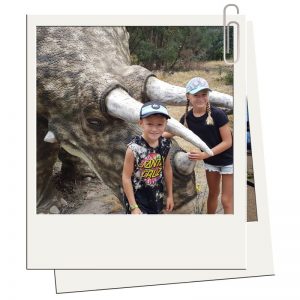Practicing gratitude with the family is different from doing it on your own. For a start, not everyone will have a natural affinity with noticing and appreciating the positive. Let along expressing it. Today I’ll share how we’ve been practicing gratitude with the family recently and why we’ve needed it too.
 Why our family needs gratitude
Why our family needs gratitude
The last week or so, I’ve been playing with the idea of gratitude with the whole family. It’s now two months since we let home and everyday (ok, most days,) I’m incredibly grateful for this experience. We’re travelling around Australia in our caravan, Macey, for the next twelve months. Finally, after graduation and Christmas we’re starting to settle into a bit of a routine. I say bit, because I love routine, whereas everyone else in the family is comfortable with bed at the end of each day ticking that ‘routine’ box. (I’m also learning to be OK with that.)
So, I thought gratitude would be a great place to start as we explore the science of positive psychology through the lens of a travelling family. AKA, Our adventures in positivity. Practicing gratitude isn’t a new concept. Many ancient religions pray to give thanks and express gratitude and appreciation for both large and small blessings in their lives.
Hedonic Adaption
What I find most interesting about gratitude, is regardless of the number or size of our blessings, we always adapt. (The psychological term is hedonic adaption, and if you’re interested have a look at The best bits of positive psychology.) The first week of our travels was surreal. We kept looking at each other and feeling like we’d just won lotto. We did it. Somehow, we pulled of the greatest trick ever and managed to save and plan for twelve months on the road. At the start, each moment seemed tainted with a little magical. We kept thinking of friends and family still getting up to go to work and school, making lunches and doing the dinner, bath, bed routine. Our whole family was naturally grateful as our new lives were so different to life at home.
After the Christmas period, I found myself getting cranky at the kids for silly things. The kids started expecting that our new (and pretty amazing) life was just normal and seem to be looking for something bigger and shiner to appear. And why wouldn’t they. I know all about hedonic adaption, so I should have forecast this. It seems the new normal is that we buy ice creams on sunny days, see dinosaurs, spend hours on end at skate parks and if we pass a bakery we should naturally stop, regardless of the time of day. In short, we were starting to adapt to our new life and began to take it for granted.
The science on gratitude
The science on gratitude is pretty interesting. Multiple studies have found that expressing gratitude only once a week, for multiple things, is more beneficial to your wellbeing than practicing gratitude daily. But, with all things’ science, take what works and leave the rest. So, in practicing gratitude with the family I’ve tried three different things that I think might work for our family.
Practicing gratitude with the family
Firstly, driving to or from something interesting, like a day at Sovereign Hill in Ballarat, I’ll ask the family what they appreciated most or what they are grateful for that day. This starts some cool conversations and allows them to share the special parts of their experience. It’s generally never what I think and they also have their own slant on how they see the world. Often it sparks conversation, questions or laughter. Perhaps it’s more than gratitude at work here and the connection that it brings?
Secondly, when I tuck them in, (which is now late into the night, because everyone avoids routine) we talk over what we are grateful for. It’s a different perspective and often a little more insightful. Our family are grateful for our caravan, the friends we’ve met, a slushie from McDonalds (again, because there is no routine), fire fighters, diesel, twinkling stars, toilets that flush, cuddles – every days it’s an opportunity to help our family recognise the positives in our lives.
 The last activity we’ve been doing is collecting rocks and shells. Each time we stop, whoever finds the nicest rock or shell adds it to our collection. These are a physical assortment of our memories and experiences and as we collect them we think about how much we enjoyed that town, river, beach or park.
The last activity we’ve been doing is collecting rocks and shells. Each time we stop, whoever finds the nicest rock or shell adds it to our collection. These are a physical assortment of our memories and experiences and as we collect them we think about how much we enjoyed that town, river, beach or park.
Practicing gratitude with the family isn’t hard. It does however take conscious and deliberate effort to initiate the conversations and guide the families thinking towards recognising the good things. For us, gratitude will always be a part of our lives. They way we do it thought will probably change and evolve as we do.
I encourage you to be playful with how you practice gratitude with the family. And remember to be patient with how they respond. Good luck.


 Why our family needs gratitude
Why our family needs gratitude






